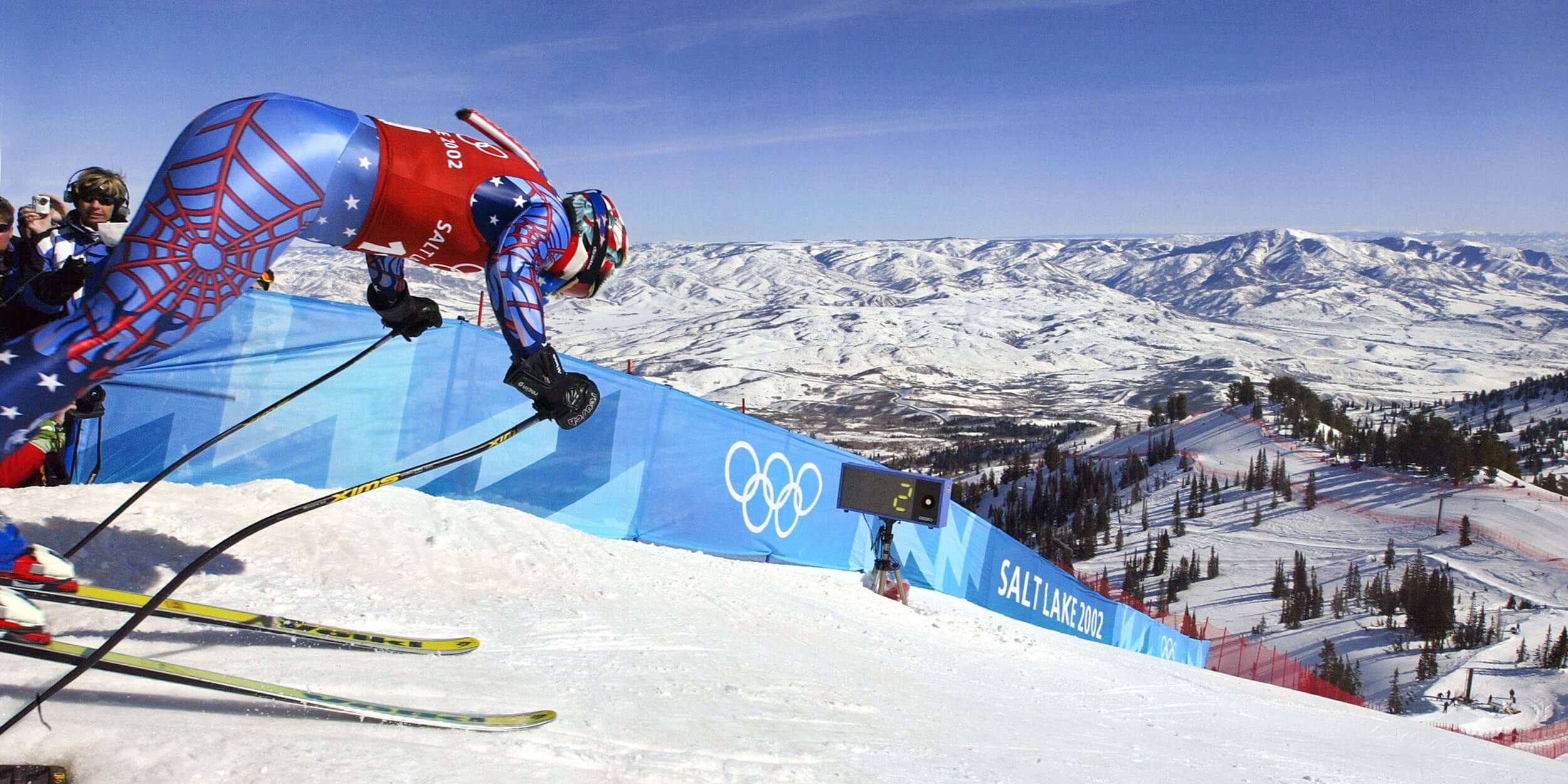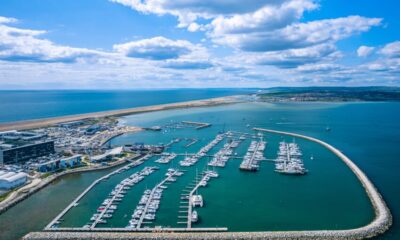Sports
With opportunities to host the Winter Olympics dwindling, Salt Lake City is poised for 2034 – and maybe beyond

SALT LAKE CITY — Lindsey Vonn was 17, in awe of her competition and feeling the weight of her first Winter Olympics experience. Before she became one of the most decorated alpine skiers in the history of the sport, Vonn was just a kid hoping to stay on the track when she made her Olympic debut 22 years ago at the 2002 Games in Salt Lake City. She finished sixth in the combined event and 32nd in the slalom.
The impact of her experiences in Utah all that time ago stayed with her through the ensuing years of gilded dominance. So much so that she kept coming back whenever she could. Before she retired in 2019 after a series of serious knee injuries, home was the suitcase she carried as she traveled around the world. Still, when asked where her home base was, she would name a series of places, always making sure to include Utah.
Vonn, now 39, is part of the Salt Lake City-Utah Committee for the Games. And with the International Olympic Committee poised to award the Beehive State the 2034 Winter Games, its second Olympic Games, Vonn believes the model for sustainability of the spectacle held every four years is to move toward to evolve from a rotating approach. And she said Salt Lake City should be at the top of the list.
“I don’t think it’s a viable blueprint these days,” Vonn said The Athletics recently. “We need a more sustainable option, and I think Salt Lake is the best Olympic option available to the world right now.”
The future of the Winter Games is clouded as governing bodies resist demands to spend billions of dollars on venues that won’t be used after the three-week event ends. Climate change has wiped out potential hosts from the map as snow levels fall in many countries around the world. The IOC can no longer operate on the assumption that the Winter Games will be a tempting endeavor for potential host cities, or will even be feasible to host in many parts of the world.
Gone are the days when the IOC wished for cities and countries to openly compete with each other in the hope of receiving the bid. Now the IOC has a future host committee that tours potential host countries and forwards its data and reports to the IOC Executive Board, which then decides whether or not to put their suggestion to a vote at an IOC session.
The IOC’s future host committee recently spent a week in Utah on an official visit to tour locations and listened to the SLC-Utah Committee’s pitch to bring back the Games.
“This is a hidden treasure, this city and this region,” said Christophe Dubi, executive director of the Olympic Games. “The rest of the world has memories of 2002, but this place has changed profoundly. This story needs to be told.”
A quick Google search shows the condition of former state-of-the-art Olympic venues that are now a dormant home to rodents, weeds and puddle water.
In Rio de Janeiro, the aquatic center built for the 2016 Summer Games was left as a hollowed-out stadium. The 35,000-seat Olympic Stadium, built for the opening and closing ceremonies in Pyeongchang, South Korea, has just been completed a mountain of grass in the form of an amphitheater – an empty theater. In total, South Korea spent an estimated $13 billion for the 2018 Winter Games.
Tokyo is home to the gymnastics center built for the 2020 Summer Games unused and surrounded through empty parking lots and gates where the same signs still hang with instructions on how to enter. It was paid for by Tokyo taxpayers and cost an estimated $180 million.
A so-called “white elephant” property requires excessive costs and high maintenance, and has little to no value once completed. They are located in cities all over the world. Hosting an Olympic Games was once seen as the most prestigious honor in sports, but residents of future cities have woken up to the waste of taxpayer money.
But it hasn’t been a waste in Salt Lake City. The locations have been maintained and used time and time again over the past 22 years.
The Olympic Oval west of the center has hosted World Cup and World Championship speed skating events. The Utah Olympic Park in Park City has also remained in the rotation for World Cup and World Championships in bobsled, luge and skeleton events. The Soldier Hollow Nordic Center, 45 minutes away in the Heber Valley, still hosts cross-country skiing and biathlon events. And the several ski areas within an hour of downtown are still staging areas for world-class freestyle skiing and snowboarding competitions. More than 90 Since 2002, Utah has hosted World Cup and World Championship Winter Olympic Games.
“It’s really great to see that we’re not looking for white elephants in the countryside – we’ve just found used, excellent locations for the next Winter Olympics,” said Karl Stoss, the future chairman of the IOC’s host committee.
Considered “climate reliable,” Salt Lake City has ready-made venues and is the leading candidate to host the 2034 Winter Olympics, just 32 years after hosting it in 2002. (Tim De Waele / Getty Images)
After the 2002 Games, the Utah Olympic Legacy Foundation assumed responsibility for the maintenance and operation of the venues. The foundation has received a $76 million endowment after the Games. With global opportunities for the IOC dwindling, Utah’s Olympic legacy makes it a logical option not only to return in 2034, but beyond.
“We have all the infrastructure. We have all locations. We have the right height. We can be economically smart with the way we organize a Games,” Vonn said. “It’s a completely different thing if you have to build an entire Olympic Stadium for all your sports. It’s just not how it’s usually approached. This makes it clear why we are the best choice for 2034 and beyond.”
During the IOC delegation’s stop, Stoss said Salt Lake City and Utah are a model for other future host countries around the world.
“We need to think about how we can bring winter sports to all continents, not just here to America,” Stoss said. “This will be a challenge for us to think about how we can motivate other countries and other national committees to participate in the Winter Games.”
While it is all but certain that Salt Lake will host in 2034, the IOC’s future host committee has still not made a decision on the 2030 host. The French Alps are currently in pole position. The IOC delegation said during their visit that finding suitable hosts for the Winter Games will become more difficult in the coming decades, and IOC President Thomas Bach said last year that by 2040 there will be only ten countries with a suitable climate. The IOC had to base itself in Beijing for the last Winter Games, in 2022, with many locations somewhere between 70 and 120 kilometers away.
“There is now an opportunity to think more broadly,” says Jacqueline Barrett, the IOC’s director of future Olympic Games, “to think about how the Winter Olympics here in 2034 can be transformative.”
Utah Olympic organizers used the phrase “ready, willing and able” back in 2015. In recent years, they were even ready in case a bid did not go through. Everything is there. And the reality is, from a Winter Games perspective, Utah can be 1-for-1.
Fraser Bullock, CEO of the Salt Lake City-Utah Committee, has estimated that the cost of the 2034 Games will be roughly $2.4 billion and will not use taxpayer money but will instead be privately funded .
The IOC is unlikely to see this anywhere else in the world, and the governing body has acknowledged that it is considering the scenario of a rotating host system in the future.
“I think that’s definitely where things are going,” Vonn said.
While Utah currently has all the power and influence over the IOC, there are issues facing the state’s residents.
Stoss said he has read climate reports from the SLC-Utah Committee that say the Winter Games could happen until 2050, but beyond that it’s a question not just for Utah but for the world. The Great Salt Lake is shrinking due to climate change, experts say. It is a potential ecological disaster if the largest saltwater lake in the Western Hemisphere continues to shrink. Despite successive harsh winters to help raise water levels, the Utah Legislature has spent about $1 billion on water conservation to help the lake.

“I think Salt Lake is the best Olympic option available to the world right now,” said Lindsey Vonn, the champion skier who now serves on the SLC-Utah Committee. (Tim De Waele / Getty Images)
Moreover, with winter storms becoming less frequent, the Wasatch Front—the cities, including Salt Lake City, that make up the growing sprawl at the base of the white-capped Wasatch Mountains—is prone to winter inversions that trap pollutants in a thick, dense smog that often hangs over the area. Part of the bid for the Games, the organizers set targets to achieve 100 percent renewable energy by 2030 and reduce CO2 emissions by 50 percent.
While it is not currently expected that taxpayer dollars will go towards paying for the costs of the 2034 Games themselves, the continued growth that Salt Lake City is experiencing is expected to bring more changes on the sports front. Utah Jazz owner Ryan Smith recently bought the rights to relocate the Arizona Coyotes for an estimated $1.2 billion. The Utah Legislature has passed a $1 billion tax bill that Salt Lake Mayor Erin Mendenhall says will transform the downtown community and help house the NBA’s Utah Jazz and NHL team.
In a recent interview with The AthleticsSmith said his decision to bring the NHL to Utah was similar to his home state wanting to bring the Olympics back for a second round.
“If you think about the Olympics and the way Salt Lake bid for the Olympics, it’s pretty much the same,” he said. ‘We are interested. We are ready. And we are a partner.”
Stoss and the IOC delegation will spend the next two months working on their report on Salt Lake City and will present their report to the IOC Executive Committee in mid-June. Stoss hopes they will then get the green light to take it to the IOC session in July in Paris to close out the worst-kept secret: that the Winter Games are headed to Utah once again. Bullock had his best poker face on at the end of the visit.
“We’re looking forward to July 24,” Bullock said.
(Top photo of American skier Picabo Street starting a descent during the 2002 Winter Olympics in Salt Lake City: Olivier Morin / AFP via Getty Images)











